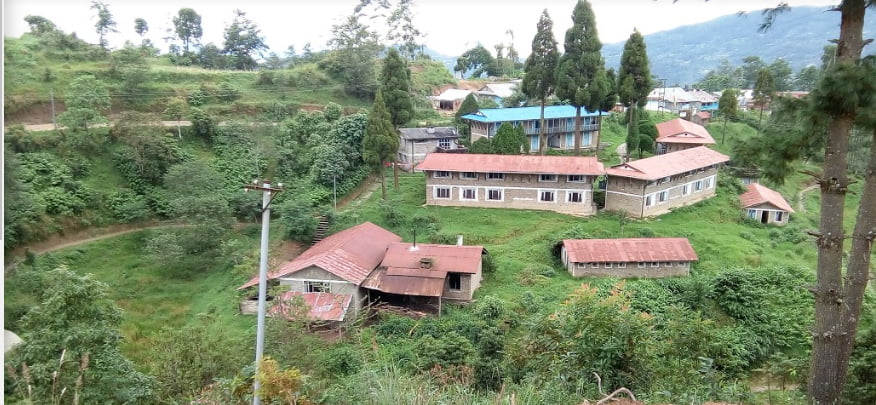Overview
Diploma in Agriculture (Veterinary Science) at Uttarpani Polytechnic Institute, Dhankuta
The Diploma in Agriculture (Veterinary Science) at Uttarpani Polytechnic Institute, Dhankuta, is a 3-year, full-time program focused on animal health, disease management, and sustainable livestock practices.
Affiliated with the Council for Technical Education and Vocational Training (CTEVT), this course prepares students to address veterinary challenges in Nepal’s agricultural sector. With 40 seats available annually, top-performing students in the CTEVT entrance examination receive a 10% scholarship.
Graduates are equipped to work in veterinary clinics, livestock farms, and government or non-profit organizations dedicated to animal health and rural development.

Curriculum Details
The program combines theoretical knowledge with practical training to build animal care and disease control expertise. Key components include:
-
Core Courses :
-
Animal Anatomy and Physiology
-
Veterinary Pathology and Disease Diagnosis
-
Animal Nutrition and Feed Formulation
-
Livestock Management and Farm Practices
-
Veterinary Pharmacology and Therapeutics
-
Disease Surveillance and Control Measures
-
-
Electives :
-
Dairy Production and Management
-
Poultry Health and Husbandry
-
Wildlife Health and Conservation
-
-
Practical Sessions :
-
Laboratory work on disease testing, microscopy, and vaccine preparation.
-
Field training in farm visits, disease outbreak management, and livestock vaccination drives.
-
Objectives
The program aims to:
-
Trained professionals to diagnose and treat common and complex animal illnesses.
-
Promote sustainable livestock practices to enhance rural livelihoods and food security.
-
Develop skills in disease prevention, vaccination programs, and biosecurity measures.
-
Prepare graduates to contribute to animal welfare initiatives and government agricultural projects.
Scope
Graduates can pursue roles in diverse sectors:
-
Veterinary Clinics: Assist veterinarians in diagnosis, surgery support, and patient care.
-
Livestock Farms: Manage herd health, breeding programs, and disease prevention strategies.
-
Government Agencies: Work as livestock health officers or extension workers in departments like the Department of Livestock Services.
-
NGOs and NGOs: Support animal health campaigns, wildlife conservation, and disaster response efforts.
-
Entrepreneurship: Start private veterinary practices, livestock consulting services, or agribusiness ventures.
Skill Development Modules
-
Clinical Skills: Hands-on training in physical examinations, disease diagnosis, and basic surgical procedures.
-
Disease Management: Techniques for identifying outbreaks, implementing quarantine protocols, and administering vaccines.
-
Farm Practices: Learning livestock breeding, feed formulation, and farm sanitation.
-
Technology Use: Utilizing software for disease tracking, herd management, and record-keeping.
Teaching Methodology
The program employs a mix of theoretical and experiential learning:
-
Lectures and Workshops: Covering topics like epidemiology, pharmacology, and biosecurity.
-
Laboratory Sessions: Practicing lab techniques such as blood analysis, parasite identification, and vaccine preparation.
-
Field Internships: Collaborations with local farms, veterinary hospitals, and government agencies to gain real-world experience.
-
Guest Lectures: Experts from veterinary organizations discuss emerging issues like zoonotic diseases and climate-resilient livestock practices.
Faculty Expertise
Faculty members are seasoned professionals with expertise in:
-
Veterinary medicine and surgery.
-
Livestock production and disease control.
-
Animal nutrition and feed management.
-
Policy implementation in agricultural development.
Admission Requirements
To enroll:
-
Hold a Secondary Education Certificate (SLC) with science subjects (Physics, Chemistry, Biology) and a minimum of 40% marks.
-
Pass the CTEVT entrance examination.
-
Preference may be given to candidates from Dhankuta and neighboring districts.
Career Opportunities
Graduates can pursue roles such as:
-
Veterinary Assistant: Supporting veterinarians in clinics and field operations.
-
Livestock Health Officer: Managing disease control programs in government agencies.
-
Animal Nutritionist: Designs dairy, poultry, and livestock farm feed plans.
-
Farm Manager: Oversee livestock production and farm operations.
-
Animal Welfare Advocate: Worked with NGOs to improve animal health standards.
Student Life and Extracurricular Activities
Students can engage in activities that complement their studies:
-
Farm Visits and Internships: Hands-on experience at local and regional livestock farms.
-
Veterinary Workshops: Training in advanced techniques like AI (Artificial Insemination) and disease surveillance.
-
Community Outreach: Organizing free veterinary camps in rural areas to provide healthcare for livestock.
Scholarships and Financial Aid
-
CTEVT Scholarships: Awarded to top entrance exam performers (10% tuition waiver).
-
Institute Scholarships: Merit-based awards for high academic achievers.
-
Government Schemes: Access to loans and subsidies under Nepal’s technical education support programs.
Why Choose This Course?
-
Practical Emphasis: Strong focus on fieldwork and internships ensures job-ready skills.
-
CTEVT Recognition: Graduates qualify for employment in both the public and private sectors.
-
Rural Relevance: Addresses livestock challenges in Nepal’s agricultural heartlands.
Why Choose Uttarpani Polytechnic Institute?
-
Location: Situated in Dhankuta, a region with abundant livestock resources for practical learning.
-
Infrastructure: Modern labs, veterinary clinics, and farm facilities for hands-on training.
-
Experienced Faculty: Mentors with industry experience in veterinary medicine and livestock management.
Conclusion
The Diploma in Agriculture (Veterinary Science) at Uttarpani Polytechnic Institute is ideal for students aiming to contribute to Nepal’s agricultural and animal health sectors. By blending academic rigor with real-world experience, the program empowers graduates to tackle veterinary challenges, support rural economies, and advance sustainable livestock practices. Applications are processed through the CTEVT portal; interested candidates should contact the institute for admission details.














